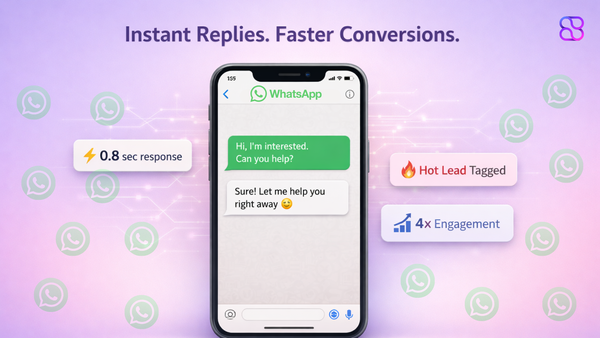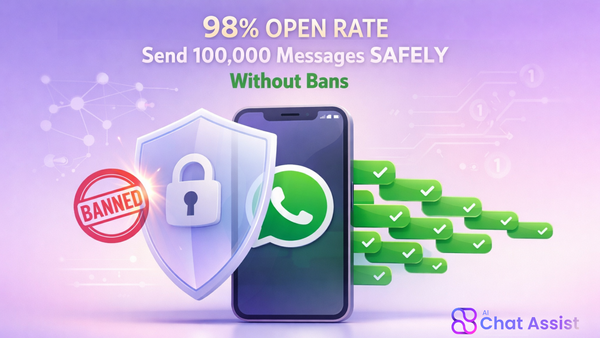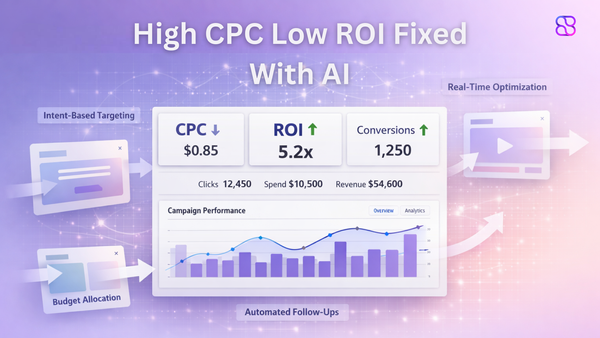AI chatbots and social media: Can they really handle conversations at scale? The results will surprise you!

In today’s fast-paced digital world, social media has become a dominant platform for communication, brand engagement, and customer service. Companies are under constant pressure to manage conversations across multiple channels in real time. The question arises: can AI chatbots handle conversations at scale on social media? The answer is yes, but there’s more to the story than you might think.
The Growing Importance of AI in Social Media Marketing
With over 4.8 billion social media users worldwide, businesses are increasingly relying on AI chatbots to manage customer interactions. These bots are not just about automation but aim to provide intelligent, human-like interactions, often referred to as Conversational AI. Whether on Instagram, Twitter, or Facebook, AI customer service is becoming the backbone of many brands' customer engagement strategies.
How AI Chatbots Work on Social Media
AI chatbots use natural language processing (NLP) to understand and respond to customer inquiries. These AI virtual assistants can perform a variety of tasks, from answering simple queries to resolving complex customer issues. Platforms like AIChatAssist offer advanced chatbot software that can be integrated seamlessly with different social media platforms, making real-time interaction smoother for both brands and customers.
One significant benefit of Conversational AI is its ability to operate 24/7, responding to messages instantly, which improves customer satisfaction. Brands no longer have to worry about missing inquiries due to time zone differences or holiday hours. But can AI really handle conversations at scale, especially with millions of users?
The Power of Scaling Conversations: A Case Study
Consider a case study from a global fashion retailer that implemented AI chatbots across their social media marketing campaigns. Before the integration, customer support teams struggled to keep up with thousands of daily inquiries on platforms like Instagram and Twitter. After deploying the best AI chatbot for websites and social media, the company saw a 65% reduction in response time and a 30% increase in customer satisfaction.
Another significant result was cost savings. By automating repetitive queries and using AI virtual assistants, the retailer reduced their customer service costs by 40%. What’s more, customer engagement increased, as the chatbot was able to tailor responses based on the individual’s past interactions and preferences.
Chatbots in Customer Support: How Effective Are They?
If you're wondering how to use AI in customer support, chatbots have proven effective in several areas:
Speed and Efficiency: AI-powered bots can handle multiple conversations simultaneously, ensuring no customer is left waiting. This is crucial in SMM marketing, where speed is of the essence.
Personalization: AI chatbots can provide personalized experiences by analyzing previous conversations and customer data. This capability allows brands to interact with their audience on a deeper level, fostering long-term loyalty.
24/7 Availability: With social media posting happening around the clock, businesses can’t afford downtime. AI chatbots ensure that customers are supported regardless of the time of day.
For more insights on how AI is transforming customer support and marketing, check out resources like Stay Updated AI Bot.
Challenges Faced by AI Chatbots in Social Media
Despite the numerous advantages, AI chatbots are not without their challenges. For instance, understanding the nuances of human language, including sarcasm, humor, and complex emotions, remains difficult for even the most advanced AI systems. While bots are getting better at handling these complexities, there’s still room for improvement.
Moreover, users can sometimes become frustrated if they feel they are speaking to a machine rather than a human. This is where balancing AI automation with human oversight becomes critical. In fact, businesses that complement Conversational AI with human support often see higher customer satisfaction rates.
Social Media Platforms Leading the Way with AI Chatbots
Several social media platforms are embracing AI chatbots as part of their core functionality. Facebook Messenger and WhatsApp, for example, provide businesses with tools to integrate AI chatbots directly into their messaging systems. This has led to a rise in social media marketing efforts that rely on AI customer service to engage users effectively.
Platforms like Instagram are also integrating AI into their ecosystem, where brands can automate interactions with Instagram influencers and manage their brand reputation through social searcher tools.
Best Practices for Implementing AI Chatbots
If you're considering using AI for social media marketing, there are a few best practices to keep in mind:
Choose the Right Chatbot Software: Not all chatbots are created equal. Ensure that the chatbot software you choose is adaptable, scalable, and integrates smoothly with your existing systems.
Monitor and Optimize: AI bots need constant optimization. Make sure you're regularly reviewing the bot’s performance and making adjustments as necessary.
Balance Automation and Human Support: While AI can handle most tasks, some customer queries may still require human intervention. An effective handoff between bot and human agents is essential for a seamless customer experience.
For more in-depth strategies and tools on AI integration, visit Open Infotech's
Conclusion: Can AI Really Handle Conversations at Scale?
So, can AI chatbots handle conversations at scale? The answer is a resounding yes, but with a few caveats. The technology is rapidly evolving, and while chatbots can manage thousands of interactions simultaneously, their effectiveness depends on how well they are programmed and maintained. With the right strategies and tools, brands can successfully use AI chatbots to transform their social media marketing efforts, drive engagement, and boost customer satisfaction.
As businesses continue to scale and customer expectations rise, the role of AI virtual assistants in managing these interactions will only grow. The future of customer service and social media platforms is undoubtedly intertwined with AI technology, offering exciting possibilities for businesses willing to invest in this growing trend.
Relevant Resources:





